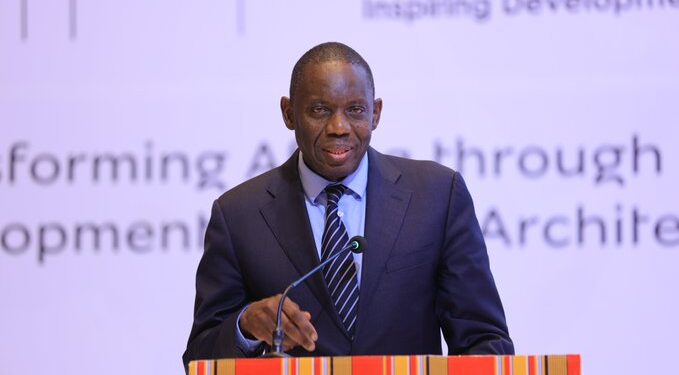Munyonyo – Governor of the Bank of Uganda, Michael Atingi-Ego, has called for bold reforms in the financing of Africa’s development agenda, urging national development banks to scale up capital mobilisation, embrace climate-smart growth, and anchor industrialisation efforts to drive the continent’s transformation.
Speaking at the inaugural Uganda Development Finance Summit at Speke Resort, Munyonyo, Governor Atingi-Ego applauded the Uganda Development Bank (UDB) for convening what he described as “a very vital and powerful platform” bringing together policymakers, financiers, and development experts from across Africa and beyond.
“Because of the limited capacity of development banks to meet the long-term needs of the private sector, commercial banks have been forced to step in. But they are naturally structured for short-term lending,” Atingi-Ego observed. “Commercial banks are turning short-term liabilities into long-term assets—and that is very expensive.”
He challenged African governments and financiers to explore innovative approaches to mobilising long-term capital for climate financing, infrastructure development, and industrial growth. “National development banks must drive the green industrialisation policy—financing Africa’s shift to climate-smart growth, expanding energy access, and unlocking private climate investment,” he stressed.

Call for Action
Reflecting on the summit theme, “Transforming Africa Through National Development Finance Architecture,” Atingi-Ego insisted it was more than a topic for debate. “This is a call for action for 1.4 billion Africans,” he said. “We have heard clear demands for lower interest rates, deeper regional integration, and export-led industrial policies. Let us not leave these ideas in this room. We must build an African architecture of transformation—and that demands unity and collective action.”
The Governor also called for the introduction of new financial instruments to deepen Africa’s capital markets. “Our fixed-income markets are dominated by government securities. We need to think about sukuk, diaspora bonds, infrastructure bonds, and green bonds. The question is—do we have the projects to absorb the capital we raise? That is critical.”
He further called for a global financial system that reflects Africa’s realities, including reforms in credit rating systems to support rather than constrain the continent’s growth ambitions.
Leaders Demand Capitalisation, Clear Priorities, and Good Governance
The closing plenary, “Reimagining National Development Banks as Architects of Inclusive and Sustainable Transformation,” featured high-level panellists, including Patricia Ojangole, Managing Director of Uganda Development Bank (UDB) and Chairperson of the African Association of Development Finance Institutions (AADFI); Pamela Mbabazi, Executive Chairperson of Uganda’s National Planning Authority; Dr. Rita Babihuga-Nsanze, Chief Economist at the Africa Finance Corporation; and Peter Muriu, Associate Professor at the University of Nairobi.

Dr. Ojangole stressed the importance of strong capitalisation and strategic interventions: “If governments do not finance national development banks, then someone else will—and that funding will inevitably serve their own agenda rather than the government’s agenda,” she warned. “Capitalisation and the right type of funding are essential, but what truly matters is the quality of resources and their impact.”
She went on: “At UDB, building solutions that address our local development challenges is central to our mandate. We carefully identify the best interventions and ensure that every step we take is backed by solid research, which we have fully integrated into our work. Beyond financial sustainability, we are equally committed to demonstrating sustainability on the socio-economic front. We strive to balance financial soundness with tangible economic impact, and we consistently demonstrate this balance to our shareholders.”
Pamela Mbabazi emphasised alignment with Uganda’s National Development Plan (NDP): “The NDP is the North Star guiding all our development efforts. UDB must structure financial pathways so that every shilling advances our national priorities—from agro-industrialisation to science, technology, and innovation,” she said.

Dr. Rita Babihuga-Nsanze highlighted the need for risk management, governance, and sustainability in development finance institutions. “Prudent risk and portfolio management are essential to create value for the capital invested. Institutions must be professionally run to attract partners and deliver both financial and socio-economic returns,” she said.
She added: “60 percent of the increase in our capital has come from our own profits, while the remaining 40 percent has largely been sourced from domestic capital. In today’s environment of increasingly nationalistic policies, a trend that is here to stay, the way we generate capital to sustain our businesses must follow a deliberate approach. For multilateral development banks that rely heavily on government financing, the reality is that governments themselves are facing growing financing pressures.”












